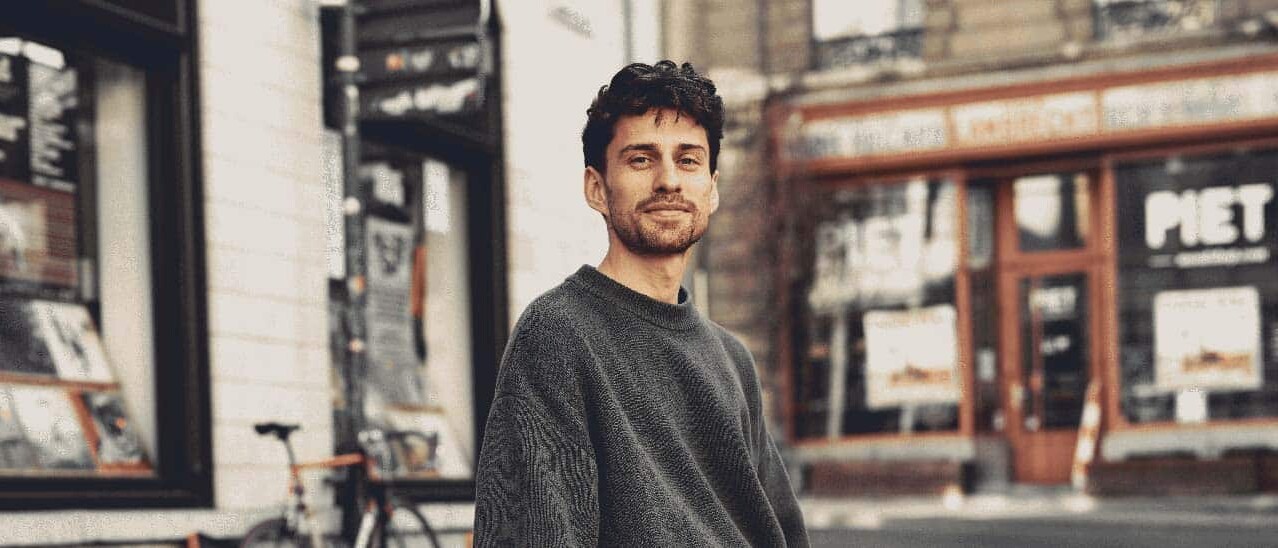A conversation with Kasper Albers
Kasper, who are you and what does Borro do?
I’m Kasper Albers, based in Brussels. About a year and a half ago, I co-founded Borro with Glen Verhaeghe, a product developer from Antwerp. I handle the commercial and financial side. Borro enables large-scale reuse through a digital deposit system, focusing on football stadiums, concert venues, and theme parks—places with high volume, closed environments, and recurring events.
When did you decide to go full-time with Borro?
Kasper: After being accepted into the IMEC iStart accelerator program, we had to make a choice: continue part-time or go all in. We opted decisively for the latter. At the same time, we made a strategic shift: away from foodservice and toward large-scale events, where the potential is much greater.
How did that shift come about?
Kasper: In foodservice, we worked with reusable bowls, but the volumes were too low. Large events like festivals and football matches demand speed and scale. When we joined IMEC iStart, we saw the opportunity to validate our digital system with football clubs—and it worked.
How did you and Glen start working together on Borro?
Kasper: Glenn is the original creator of the concept. We had previously worked together in a non-profit at the start of the COVID crisis. After a break, he reconnected with his idea, and I joined to help build the commercial side. Our skills complement each other well.
How did you test whether the idea worked?
Kasper: We started from real-world frustrations. Three criteria were essential to us: intuitive, simple, and affordable. Many existing systems failed on at least one of those points. We conducted interviews with clubs and ran a successful pilot at Anderlecht. That gave us confidence—and helped with our first investment round.
Did you raise funds via ‘friends, family & fools’?
Kasper: Not really. We received startup capital from IMEC iStart but worked without pay for the first six months. Later, we raised capital through Seeder Fund, another IMEC fund, and four private investors from our extended network—not direct friends or family.
What’s your growth strategy?
Kasper: We focus on venues with high volumes, closed settings, and recurring events. Think stadiums, concert halls, theme parks. We approach customers directly—through connections or LinkedIn. We position Borro as a digital layer between the cash register and the cup supplier—in collaboration, not in competition.
What defines your ideal customer?
Kasper: Customers with clear pain points: frustrated visitors, manual handling, hidden costs from fraud or refunds. They have high volume, repetition, and an open mindset toward innovation and sustainability.
How do you approach customer acquisition?
Kasper: Through various channels: warm introductions, LinkedIn, inbound leads. Always with a focus on mutual reinforcement, not as a threat. We want partnerships, not traditional sales relationships.
What are the biggest challenges for further growth?
Kasper: Staying focused and choosing the right partners. We get many interesting inquiries but need to be strict in our selection. Building long-term partnerships that really add value is also crucial.
Are you ready for international expansion?
Kasper: Yes. We already ran a successful pilot in the Netherlands. For us, Belgium and the Netherlands are really one market. We’re also seeing interest from other European countries.
How do you ensure partnerships don’t become non-committal collaborations?
Kasper: By offering a product that strengthens the partner without undermining their core business. The collaboration must provide strategic value for both sides.
How do you maintain your lead over the competition?
Kasper: By developing faster and working with the right partners. In addition, we’ve developed and protected our own technology, which makes copying more difficult. But we’re aware that competitors will still try.
What are possible risks of failure?
Kasper: Bad hires at an early stage. The first five people you hire determine whether you accelerate or slow down. We’re being very sharp about that.
Kasper, any final message about entrepreneurship?
Kasper: Although I have a background in innovation and entrepreneurship studies, much of what we did was based on intuition. We’ve learned that you need to be comfortable with uncertainty, act fast, and learn along the way.
Lessons Learned from the Conversation with Kasper
The 5 Key Lessons from the Cockpit Conversation
1. Focus on real customer problems and simplicity
Borro started from concrete frustrations voiced by customers and users. By focusing on intuitive, simple, and affordable solutions, they managed to become relevant and impactful quickly. Customer-centric thinking and action form the foundation for sustainable growth.
2. Validate iteratively and learn fast
The team tested their solution directly in practice with major clients (like Anderlecht), which not only built confidence but also provided instant feedback. By working iteratively and learning from pilots, they were able to improve quickly and accelerate growth opportunities.
3. Complementary team with clear roles
The collaboration between the founders—with each having their own area of expertise (commercial/financial vs. product development)—formed a strong foundation. A complementary team with clearly defined responsibilities is crucial in the early growth phase.
4. Strategic partnerships as leverage, not a threat
Borro deliberately chooses partnerships that offer mutual benefits. By positioning themselves as the digital layer between the cash register and the cup supplier, they strengthen existing players instead of competing. This opens doors and speeds up adoption.
5. Focus and discipline in decision-making
Although many opportunities exist, Borro remains loyal to its core market and consciously says ‘no’ to distractions. That focus—on large, closed, and recurring events—ensures that resources are used efficiently and growth is structural.
These five lessons capture the essence of the cockpit conversation and provide a practical framework for other entrepreneurs looking to grow strategically.
